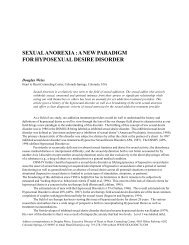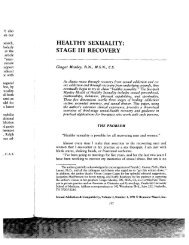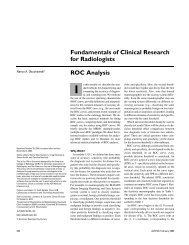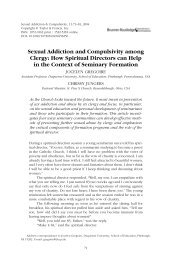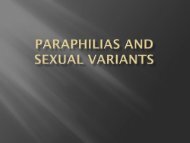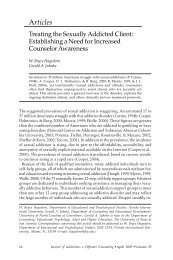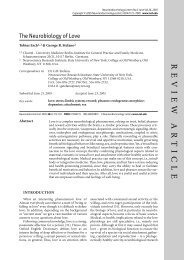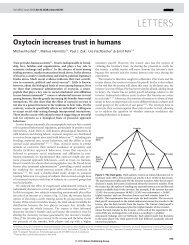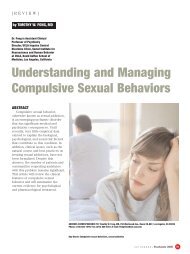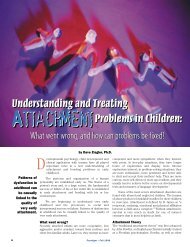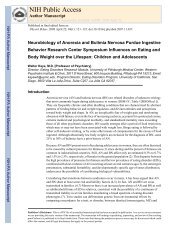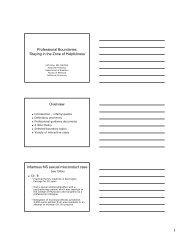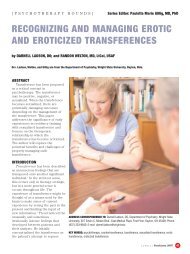An Overview of Psychiatric Ethics
An Overview of Psychiatric Ethics
An Overview of Psychiatric Ethics
Create successful ePaper yourself
Turn your PDF publications into a flip-book with our unique Google optimized e-Paper software.
In addition to the “patient’s right to know”, telling the patient has many benefits. Patients and/orfamilies should be told the diagnosis as early as possible in the disease process. Having family (orinformal carer) involved in the discussion <strong>of</strong> the disclosure process is highly beneficial.The physician should give accurate and reliable information, using simple language. He should alsoassess the patient’s and the family’s understanding <strong>of</strong> the situation. As usual, the bad news shouldbe accompanied by information on a treatment and management plan. Information on physical orspeech therapy, support groups, day care centres, and other interventions should be provided. Itshould also be emphasised that a reorganised family network can alleviate the carer’s burden andmaintain quality <strong>of</strong> life as far as possible.62There are some exceptions, some <strong>of</strong> them transitory, to the disclosure <strong>of</strong> the diagnosis to a patientwith dementia: 1) severe dementia where understanding the diagnosis is unlikely, 2) when a phobiaabout the condition is likely, or 3) when a patient is severely depressed;Dual Responsibilities <strong>of</strong> Psychiatrists: These situations may arise as part <strong>of</strong> legal proceedings(i.e. fitness to stand trial, criminal responsibility, dangerousness, testamentary capacity) or othercompetency-related needs, such as for insurance purposes when evaluating claims for benefits, orfor employment purposes when evaluating fitness to work or suitability for a particular position orspecific task.During therapeutic interactions conflicting situations may arise, if the physician’s knowledge <strong>of</strong> thepatient’s condition cannot be kept private or when clinical notes or medical records are part <strong>of</strong> alarger employment dossier, hence not confidential to the clinical personnel in charge <strong>of</strong> the case(i.e. the military, correctional systems, medical services for employees <strong>of</strong> large corporations,treatment protocols paid by third parties).It is the duty <strong>of</strong> a psychiatrist confronted with dual obligations and responsibilities at assessmenttime to disclose to the person being assessed the nature <strong>of</strong> the triangular relationship and theabsence <strong>of</strong> a therapeutic doctor-patient relationship as well as the obligation to report to a thirdparty, even if the findings are negative and potentially damaging to the interests <strong>of</strong> the personunder assessment. Under these circumstances, the person may choose not to proceed with theassessment.Additionally, psychiatrists should advocate for separation <strong>of</strong> records and for limits to exposure <strong>of</strong>information so that only elements <strong>of</strong> information that are essential for purposes <strong>of</strong> the agency canbe revealed.Appendix 3 – Declaration <strong>of</strong> Helsinki (1964)Recommendations guiding physicians in biomedical research involving human subjects, adoptedby the 18th World Medical Assembly, Helsinki, Finland, June 1964, amended by the 29th WorldMedical Assembly, Tokyo, Japan, October 1975, and the 35th World Medical Assembly, Venice,Italy, October 1983.IntroductionIt is the mission <strong>of</strong> the physician to safeguard the health <strong>of</strong> the people. His or her knowledge andconscience are dedicated to the fulfilment <strong>of</strong> this mission.The Declaration <strong>of</strong> Geneva <strong>of</strong> the World Medical Association binds the physician with the words,“The health <strong>of</strong> my patient will be my first consideration,” and the International Code <strong>of</strong> Medical <strong>Ethics</strong>declares that, “A physician shall act only in the patient’s interest when providing medical care whichmight have the effect <strong>of</strong> weakening the physical and mental condition <strong>of</strong> the patient.”The purpose <strong>of</strong> biomedical research involving human subjects must be to improve diagnostic,therapeutic and prophylactic procedures and the understanding <strong>of</strong> the aetiology and pathogenesis<strong>of</strong> disease.



